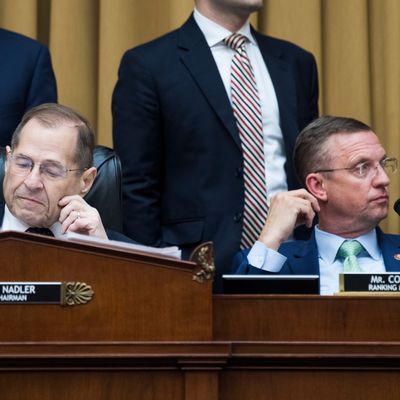
Having earlier announced that his Judiciary Committee is already conducting impeachment proceedings against Donald J. Trump, Representative Jerrold Nadler is moving this week to adopt committee rules for these proceedings, as the New York Times reported:
If adopted, the new procedures would allow the committee’s chairman, Representative Jerrold Nadler of New York, to designate hearings of either the full Judiciary Committee or its subcommittees to be a part of the inquiry and subject to special rules. Though it sounds inconsequential, including the smaller, nimbler subcommittees in the inquiry would allow Democrats to speed up their work or steer less significant witnesses to the smaller panels.
Another provision says that after lawmakers themselves have exhausted time for questioning, committee staff members would be allowed to question a witness “for an additional hour equally divided between the majority and minority.” Democrats hope the arrangement will allow for more detailed, uninterrupted questioning.
The resolution also sets out standards that say information collected by the committee from witnesses or grand jury information shared by the courts should be kept private unless Mr. Nadler chooses otherwise.
And, for the first time, Mr. Trump and his legal team would be afforded specific due process by the committee, allowing them to regularly offer input on the findings of the investigation.
These steps are all in line with past presidential impeachments. But Judiciary Committee Republicans and conservative-media types are all howling that Nadler has left out a crucial step:
“If they really want to do this, they have to bring impeachment to the floor,” he said, pointing to rules that call for the full House to vote on approving an impeachment investigation. “This is simply a show, a travesty, and frankly they should be ashamed.”
The Georgia Republican said that Democrats “can change committee rules as long as they don’t violate House rules.”
Collins is implicitly conceding that nothing in the Constitution requires the House to authorize impeachment inquiries; a formal article of impeachment is all the founding document mentions. As to the requirements of House rules — well, that’s debatable. Those rules provide a procedure for authorization of impeachment hearings, but it’s entirely unclear that they are required. UNC professor of jurisprudence Michael J. Gerhardt testified before the Judiciary Committee earlier this year that no full House authorization has been acknowledged as mandatory in the past:
[There was no] House resolution authorizing this Committee to consider whether or not Justice William O. Douglas had committed any impeachable offenses. The matter died in committee but only after some initial, brief deliberation and investigation were done. Nor was there a House resolution authorizing three separate hearings held by this Committee in 2016, on whether John Koskinen, then the head of the Internal Revenue Service, had committed any impeachable offenses. Nor was there one, in the late 1980s, authorizing this Committee to explore whether to impeach three federal district judges. All three judges were eventually impeached, convicted, and removed from office. The lawsuit filed challenging the procedures held in the Senate was dismissed because, the Court found, it raised nonjusticiable questions left to the final discretion of the Senate.
Ultimately, the House is the master of its own rules, and the majority is the master of the House, so Collins may whinge all he wants without any consequences. It’s a separate matter as to whether the federal courts will accept Nadler’s declaration (or the committee’s vote to clarify its own procedures) that it deserves the enhanced judicial deference paid to impeachment proceedings. We’ll know soon enough.
Collins is correct, of course, in arguing that House Democrats are trying to dodge a full House vote authorizing impeachment proceedings that would likely divide Nancy Pelosi’s caucus — just such a vote would divide Republicans in similar circumstances. Thanks to the tightrope act Nadler (with Pelosi’s tacit support) has executed, Democrats won’t face a floor vote until and unless the case for actual impeachment is stronger and clearer and commands better public support than it does today. There’s no reason to force the issue right now just because Doug Collins thinks it’s a “travesty” to follow the evidence where it leads.






























